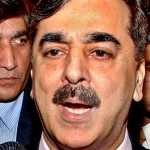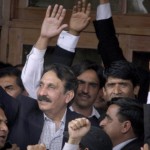Friday
Mar272009
Two-Step Analysis of Mr Obama's War Plan: Step One in Pakistan
 Friday, March 27, 2009 at 9:31
Friday, March 27, 2009 at 9:31
Related Post: Mr Obama’s War for/on Pakistan-Afghanistan - Holes in the Middle
Related Post: Mr Biden’s War? An Afghanistan-Pakistan Strategy from 2007
Related Post: Two-Step Analysis of Mr Obama’s War Plan: Step Two in Afghanistan
Related Post: Mr Obama’s War - Today Proves Pakistan is Number One
 The spin is in. The allies (NATO) and no-longer-allies (Afghan President Hamid Karzai, in a phone call from Barack Obama) have been briefed. So today, in time for Hillary Clinton's showcase conference on Afghanistan at The Hague and the NATO summit over the next two weeks, the grand Obama strategy on Pakistan and Afghanistan will be unveiled.
The spin is in. The allies (NATO) and no-longer-allies (Afghan President Hamid Karzai, in a phone call from Barack Obama) have been briefed. So today, in time for Hillary Clinton's showcase conference on Afghanistan at The Hague and the NATO summit over the next two weeks, the grand Obama strategy on Pakistan and Afghanistan will be unveiled.
STEP 1. TO THE CORE IN PAKISTAN
That's right. All the early-Administration scrapping over Afghanistan --- how many troops? nation-building or no nation-buiding? Karzai or no Karzai? --- is still significant but it's not the priority in this plan.
"One official" fed the line to CNN: "Disrupt, dismantle and defeat al Qaeda and destroy the safe haven that has developed in Pakistan and prevent it from rebuilding in Afghanistan."
Destroy in Pakistan first means the US stops "al Qaeda" in Afghanistan later.
Forget for the moment the obvious: "al Qaeda" in Afghanistan is not the primary challenge (my own suspicion is that's a spectral excuse). Give the benefit of the doubt to the Administration: attention to the safe havens is occuring because they are underpinning the Afghan insurgency --- it is not occurring as a diversion/alternative to the failure of the American political-economic-military approach in Afghanistan.
How will the destruction of these safe havens, presumably by an expansion of US airstrikes and pressure on the Pakistani military to up its ground operations, lead to stability in Pakistan?
The Administration's answer will be the accompanying increase in economic aid, tripling to $1.5 billion per year. Yet that in itself ignores the obvious: Pakistan has been receiving big, big bundles of American cash since September 2001? Given past allegations that US economic aid has been swallowed up by corruption and mis-expenditure, that it has been diverted to other projects unrelated to the "War on Terror", that the current Government of Pakistan is led by a President who has been convicted elsewhere for financial impropriety (and charged with the crime in his own country), how does this version of the Obama "stimulus package" differ from those over the last seven-plus years?
And while we're raising an eyebrow over the easy narrative of a new US-Pakistan co-operation (We Bomb; You Build), how does this square with Thursday's story from the New York Times?
So somehow the US has to turn the "good" elements in the Pakistani Government against the "rogue" elements in the ISI. That lead, however, cannot come from President Asif Ali Zardari, who has effectively been sidelined both by Washington and by his internal travails. Another New York Times story tipped off the US head-scratching over a political solution:
Instead of working through this complex political equation, the US option will probably be to find its "good" elements in the Pakistani military, who may happen to benefit from the increased American aid. The Pakistani military commander, General Ashfaq Pervez Kiani, has been across the world from Washington to Kabul to Islamabad in consultations with US officials, and it is notable that CIA Director Leon Panetta was in Pakistan last Sunday for further talks.
The same General, however, has not been on board publicly with an offensive against the "safe havens", and the Pakistani Army in its limited operations in recent months has been firmly rebuffed by local forces. The default position has been a tacit acceptance of the US aerial assault, even though that has not brought a marked change in the political situation. To the contrary, the autonomy of local leaders, symbolised by the declaration of sharia law, has increased.
Could the Obama Administration really be pushing for a tacit strategic takeover by the Pakistani military? In exchange for bowing to the US demands to take a more aggressive approach to the "safe havens" in the northwest provinces and to curb the ISI, the "good" allies would get a healthy cut of US assistance and an enhanced internal power.
Related Post: Mr Biden’s War? An Afghanistan-Pakistan Strategy from 2007
Related Post: Two-Step Analysis of Mr Obama’s War Plan: Step Two in Afghanistan
Related Post: Mr Obama’s War - Today Proves Pakistan is Number One
 The spin is in. The allies (NATO) and no-longer-allies (Afghan President Hamid Karzai, in a phone call from Barack Obama) have been briefed. So today, in time for Hillary Clinton's showcase conference on Afghanistan at The Hague and the NATO summit over the next two weeks, the grand Obama strategy on Pakistan and Afghanistan will be unveiled.
The spin is in. The allies (NATO) and no-longer-allies (Afghan President Hamid Karzai, in a phone call from Barack Obama) have been briefed. So today, in time for Hillary Clinton's showcase conference on Afghanistan at The Hague and the NATO summit over the next two weeks, the grand Obama strategy on Pakistan and Afghanistan will be unveiled.STEP 1. TO THE CORE IN PAKISTAN
That's right. All the early-Administration scrapping over Afghanistan --- how many troops? nation-building or no nation-buiding? Karzai or no Karzai? --- is still significant but it's not the priority in this plan.
"One official" fed the line to CNN: "Disrupt, dismantle and defeat al Qaeda and destroy the safe haven that has developed in Pakistan and prevent it from rebuilding in Afghanistan."
Destroy in Pakistan first means the US stops "al Qaeda" in Afghanistan later.
Forget for the moment the obvious: "al Qaeda" in Afghanistan is not the primary challenge (my own suspicion is that's a spectral excuse). Give the benefit of the doubt to the Administration: attention to the safe havens is occuring because they are underpinning the Afghan insurgency --- it is not occurring as a diversion/alternative to the failure of the American political-economic-military approach in Afghanistan.
How will the destruction of these safe havens, presumably by an expansion of US airstrikes and pressure on the Pakistani military to up its ground operations, lead to stability in Pakistan?
The Administration's answer will be the accompanying increase in economic aid, tripling to $1.5 billion per year. Yet that in itself ignores the obvious: Pakistan has been receiving big, big bundles of American cash since September 2001? Given past allegations that US economic aid has been swallowed up by corruption and mis-expenditure, that it has been diverted to other projects unrelated to the "War on Terror", that the current Government of Pakistan is led by a President who has been convicted elsewhere for financial impropriety (and charged with the crime in his own country), how does this version of the Obama "stimulus package" differ from those over the last seven-plus years?
And while we're raising an eyebrow over the easy narrative of a new US-Pakistan co-operation (We Bomb; You Build), how does this square with Thursday's story from the New York Times?
The Taliban’s widening campaign in southern Afghanistan is made possible in part by direct support from operatives in Pakistan’s military intelligence agency, despite Pakistani government promises to sever ties to militant groups fighting in Afghanistan, according to American government officials.
The support consists of money, military supplies and strategic planning guidance to Taliban commanders who are gearing up to confront the international force in Afghanistan that will soon include some 17,000 American reinforcements.
Support for the Taliban, as well as other militant groups, is coordinated by operatives inside the shadowy S Wing of Pakistan’s spy service, the Directorate for Inter-Services Intelligence, the officials said. There is even evidence that ISI operatives meet regularly with Taliban commanders to discuss whether to intensify or scale back violence before the Afghan elections.
So somehow the US has to turn the "good" elements in the Pakistani Government against the "rogue" elements in the ISI. That lead, however, cannot come from President Asif Ali Zardari, who has effectively been sidelined both by Washington and by his internal travails. Another New York Times story tipped off the US head-scratching over a political solution:
Now, as the Obama administration completes its review of strategy toward the region this week, his sudden ascent has raised an urgent question: Can [Nawaz] Sharif, 59, a populist politician close to Islamic parties, be a reliable partner? Or will he use his popular support to blunt the military’s already fitful campaign against the insurgency of the Taliban and Al Qaeda?
Instead of working through this complex political equation, the US option will probably be to find its "good" elements in the Pakistani military, who may happen to benefit from the increased American aid. The Pakistani military commander, General Ashfaq Pervez Kiani, has been across the world from Washington to Kabul to Islamabad in consultations with US officials, and it is notable that CIA Director Leon Panetta was in Pakistan last Sunday for further talks.
The same General, however, has not been on board publicly with an offensive against the "safe havens", and the Pakistani Army in its limited operations in recent months has been firmly rebuffed by local forces. The default position has been a tacit acceptance of the US aerial assault, even though that has not brought a marked change in the political situation. To the contrary, the autonomy of local leaders, symbolised by the declaration of sharia law, has increased.
Could the Obama Administration really be pushing for a tacit strategic takeover by the Pakistani military? In exchange for bowing to the US demands to take a more aggressive approach to the "safe havens" in the northwest provinces and to curb the ISI, the "good" allies would get a healthy cut of US assistance and an enhanced internal power.

 Update (23 March): President Zardari has responded to the political manoeuvres with his own call for reconciliation.
Update (23 March): President Zardari has responded to the political manoeuvres with his own call for reconciliation.  A week after President Asif Ali Zardari gave way to the demands of the Long March, Chief Justice Iftikhar Chaudhry (pictured) was
A week after President Asif Ali Zardari gave way to the demands of the Long March, Chief Justice Iftikhar Chaudhry (pictured) was  12 noon GMT: Imran Khan, the leader of the Tehrik-i-Insaf (Pakistan for Justice) party,
12 noon GMT: Imran Khan, the leader of the Tehrik-i-Insaf (Pakistan for Justice) party,  9:05 p.m. Geo News reports
9:05 p.m. Geo News reports 